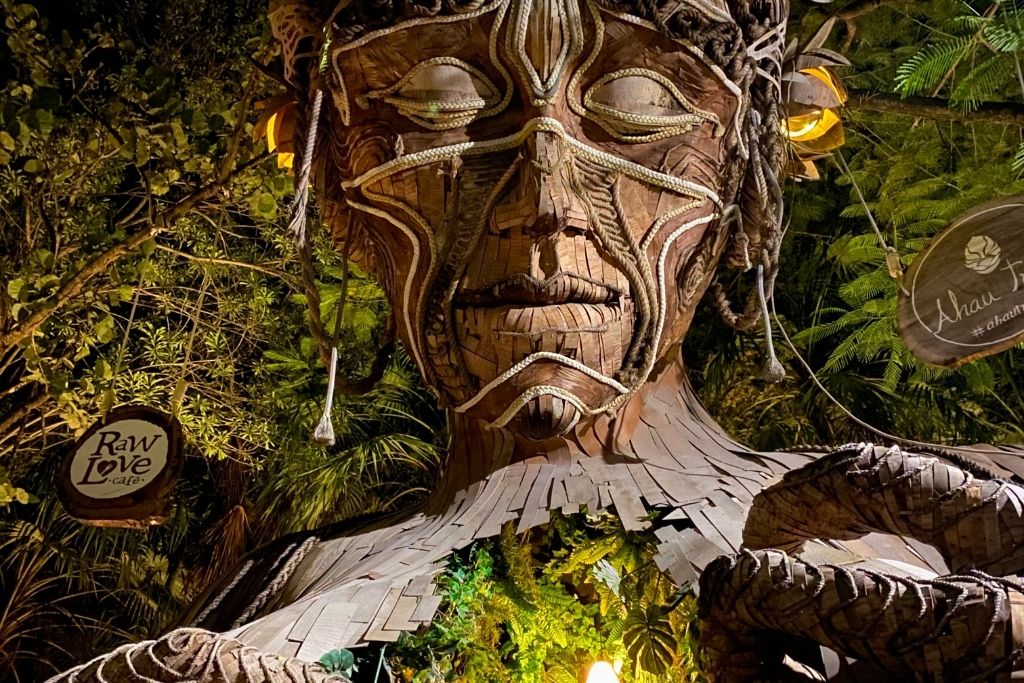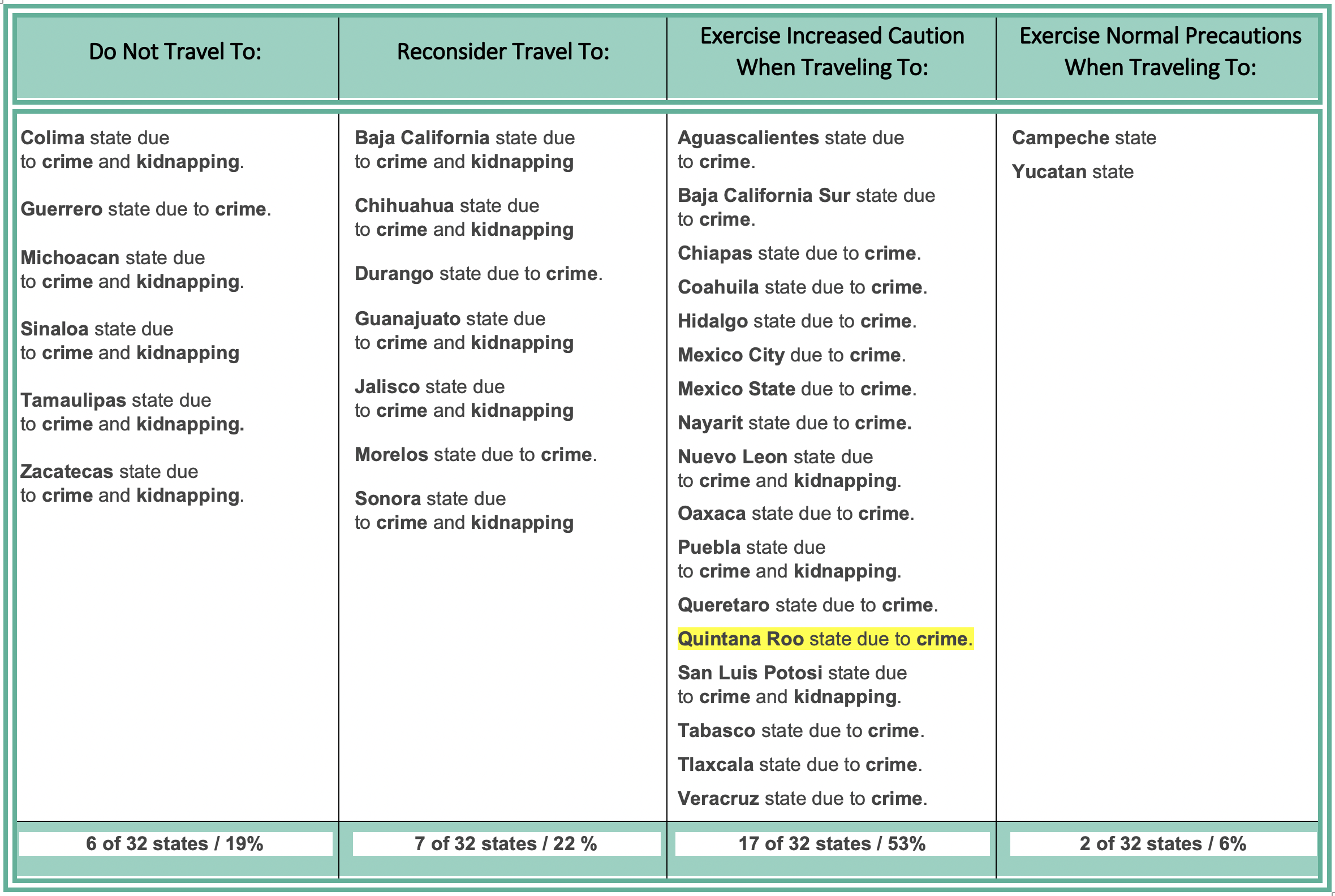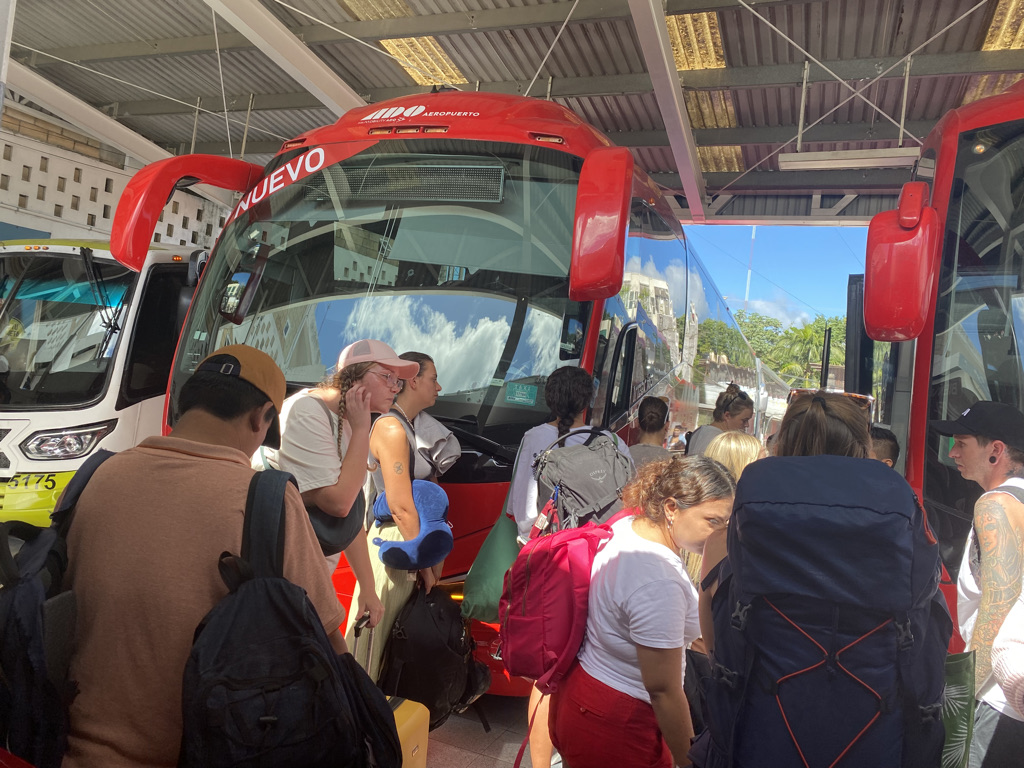Is Tulum Safe for Travel (2024)?✨Local’s Guide✨
Wayward in Mexico contains affiliate links. If you make a purchase using one of the below links, I may receive compensation from the company at no additional cost to you. Read my privacy policy here.
PLANNING A VISIT TO TULUM IN 2024 AND NEED SAFETY INFO?
When I moved to Tulum in 2022, I wondered if I would feel safe here. Now that I’m a local, I’m happy to share this guide with you so you feel confident exploring Tulum.
I’ll cut to the chase. Overall, Tulum is safe for travelers.
I take certain precautions as I would in any medium-sized city with lots of tourism where I am still learning the customs. I’m going to share some safety essentials particular to Tulum. Once you know them, there is nothing stopping you from having an amazing time here!

About Tulum
Tulum is located on the East coast of the Yucatan Peninsula in the the state of Quintana Roo (pronounced keentana ROW). Tulum was inhabited by the Mayan people who built beautiful temples and government buildings before they abandoned them to Spanish occupiers in the 16th century.
The Mayan Ruins still stand today and are a very popular tourist attraction in Tulum.
You may be asking yourself, is Tulum worth visiting? Read my post about the pros and cons of visting Tulum.

Tulum is a part of the Mayan Riviera as are Playa del Carmen and Cancún, much larger cities that sit one and two hours north of Tulum, respectively. Much of the coast of the Mayan Riviera is beautiful white sand beach with warm tropical waters ideal for swimming, snorkeling and SCUBA diving.
The Mayan Riviera is warm year-round and makes for an ideal getaway for travelers from cooler climates. Accordingly, the peak tourist season in Tulum is December through March annually.
Tulum is known for its beautiful beaches, majestic Mayan ruins, holistic healing culture, and music scene. It is growing rapidly due to high levels of tourist travel to the area. In 2020, the last time the government reported census data, the population of Tulum was 46, 721. This is up 65.3% from 2010. Click here to see more Tulum economic data from the Mexican government.
Tourism Safety in 2024?
In general, Tulum feels very safe in the daytime in well-populated areas. You’ll see women in bathing suits alone or in small groups in stores or walking the main road in Tulum and no one bothers them. A woman is more likely to get cat-called by a fellow tourist than a local from Tulum. This is likely because Tulum is located on the beach and minimally clad bodies are common place.

The economy in Tulum is largely dependent on tourism and everyone here knows this. Locals have an incentive to be welcoming to tourists.
That said, there are some safety considerations to be aware of when traveling in Tulum.
Are There Any Travel Advisories for Tulum?
Yes, but also not really. The US Department of State assigns one of four designations to each of the 32 states in Mexico: Do Not Travel To, Reconsider Travel To, Exercise Increased Caution When Traveling To, and Exercise Normal Precautions When Traveling To.
Tulum, in the state of Quintana Roo, is listed as Exercise Increased Caution When Traveling To. The US Dept of State lists “crime” as the reason for increased caution. This is an excerpt from the their website regarding crime in Quintana Roo:
“While not directed at tourists, shootings between rival gangs have injured innocent bystanders. Additionally, US citizens have been the victims of both non-violent and violent crimes in tourist and non-tourist areas,” and goes onto say, “exercise increased situational awareness after dark in downtown areas of Cancún, Tulum, and Playa del Carmen, and to remain in well-lit pedestrian streets and tourist zones.”

The latter is good advice. I’m going to tell you the safest places to be and how to limit your risk of being a victim of crime in Tulum.
Here’s a chart showing how Quintana Roo compares to other states in Mexico:

Source: US Department of State, November 21, 2023
Crime Incidents in Quintana Roo & Tulum
Getting accurate crime stats in Mexico, especially in places like Quintana Roo and Tulum, known for heavy tourism, can be a bit of a challenge. The government and media tend to downplay or avoid reporting it at all.
Most of the trouble happens where cartels are fighting it out. Cartels aren’t interested in hurting tourists. Rather, they’re into selling street drugs to them. If tourists get scared off by cartel drama, cartel cash flow takes a hit too.
Additionally, according to the latest update from the US Embassy & Consulates in Mexico on January 23, 2023, there have been some tense clashes between Uber and local taxi unions, resulting in injuries to US citizens.
In Tulum, taxi drivers work under a syndicate, sort of like a union, with rules about fares and which drivers get priority in prime tourist spots. In late 2022, the syndicate wasn’t thrilled about Uber barging in, fearing a hit to their earnings. Locals suspect the taxi syndicate might be connected to the local cartel mafia, which could explain the violence in early 2023 when Uber put its toe in Tulum.
Police Presence in Tulum
In Quintana Roo, the government addresses crime concerns related to cartel activity by increasing police presence. In Tulum, it’s common to see several different types of law enforcement branches around town, including municipal, state, military (akin to the national guard in the US), transportation, and marina police.

These officers carry large guns and wear military-style uniforms specific to their police branch.
It’s not uncommon to encounter a random police checkpoint where officials check IDs and inspect vehicles for contraband. It is common, however, for tourists to be waved through without being checked.
The government’s directive to the police is clear: safeguard tourists and maintain the steady flow of cash from tourism. However, in cases where police find tourists breaking the law, they will intervene.
How to Navigate Interactions with Police
Police in Tulum will threaten law-breakers with jail time, vehicle impoundment, or exorbitant fines. Often threats are out of proportion to the offenses.

While it feels icky to write, sometimes the underlying motive is a request for a bribe. All of us residents in Tulum have our own “bribe-the-police” anecdotes, almost like a rite of passage similar to receiving a traffic ticket in the US.
Unlike the U.S., where police officers are typically well-educated and well-compensated, the situation differs in Mexico.
Your response to an implicit or explicit request for a bribe depends on your tolerance for inconvenience and the severity of your offense. Options include confronting the police by insisting on a written ticket to back up the threatened action or opting for a smoother resolution by offering a small sum of money.
Surprisingly, the bribe amount might be less than you expect. In situations involving threats of jail or hefty fines, attempting to negotiate by offering an amount of money below the stated bail or penalty would likely work. If unsure, starting with 500 pesos (a commonly held bill), approximately $55 USD, is a reasonable approach.

Is it Safe to Drink the Tap Water in Tulum?
Definitely not! My partner, Dorian, grew up in Tulum. Once, during his childhood, he was playing outside with his friends and, feeling incredibly thirsty, he dashed into the house. Without a second thought, he gulped down a significant amount of tap water. I’ll spare you the details, but it led to a severe bout of intestinal upset that came on almost instantly.
Here, everyone opts for filtered water, readily available for purchase on every corner at Oxxo, 7-11, and Six (the most popular convenience store chains), as well as all grocery stores.

If you’re planning to stay in Mexico for a week or more, consider investing in the colossal water cooler-sized jug. Transporting it from the store to your accommodation may be a bit of a challenge, but it beats the daily trek for water. Fill up smaller bottles or a pitcher and store them in the fridge to ensure a constant supply of chilled water.
Given Tulum’s consistently hot and humid climate, it’s a misstep to underestimate your water intake needs.
That being said, it’s common practice to brush teeth and wash vegetables with tap water without adverse effects. However, when it comes to cooking rice and pasta, opt for the safety of bottled water.
Building Safety in Tulum
Often, balcony railings in this region tend to be lower compared to those in the US, given the variance in building code safety standards. In some instances, stair railings might even be entirely absent, and the spacing between vertical bars on both stair and balcony railings could surpass the 4″ safety threshold, potentially posing a risk for pets or small children to slip through.
Before giving pets or children unrestricted movement in your apartment or hotel room, thoroughly inspect the safety of the space.
Unless your hotel or Airbnb description specifically mentions your accommodation has an elevator, expect that it does not. Even for buildings of three or more levels, expect lots of stairs to get to your unit.
From experience, shlepping luggage, groceries and bottled water up multiple flights of stairs in the Tulum heat and humidity, can be soul-crushing.

Especially if you have a health condition that makes climbing stairs more difficult or are traveling with lots of luggage, find a room on the ground floor. Ask your Airbnb host about the specific floor of the unit you’re interested in before you book. If you’re staying at a hotel, consider calling in advance to request a room on a lower level. Making this request a week or two before your travel date can increase the likelihood of the hotel being able to fulfill your preference.
9 Must-Know Safety Tips for Tulum
1. Money
It’s wise to have some cash on hand, but avoid carrying your entire stash. When heading to the ATM, opt for daylight hours (I recommend using Santander bank for the most favorable VAT and foreign transaction fees). It’s a good practice to bring along a trusted companion. Secure your money discreetly at the ATM before venturing out.

2. Nighttime
Tulum’s well-populated areas, such as downtown and the hotel zone, generally remain safe at night, even for solo explorations. Exercise caution and avoid venturing into less familiar neighborhoods after dark unless you’re certain of their safety. Refer to my list below for the safest neighborhoods in Tulum. Maintain situational awareness, just as you would in any city at nighttime.

3. Weather Awareness
Always check the weather before stepping out. While it’s safe to assume that Tulum is perpetually hot, dress accordingly and stay hydrated. Rainfall can be intense, but it’s typically warm enough that you won’t see people bothering with rain jackets. If you’re biking, walking, or navigating on a scooter, be prepared for rapid changes in road conditions, transitioning from dry and navigable to puddle-ridden with potholes within just a few hours. Although heavy rains are common, especially during hurricane season (May-November, annually), they usually subside quickly, and the sun often dominates the sky within a couple of hours.
4. Smart Drinking

Many tourists indulge in heavy drinking when on vacation to the Mayan Riviera, and if that’s your preference, go for it. Just remember to stay hydrated. Ladies, be vigilant about your drinks—there’s always a risk of someone tampering with them. Avoid consuming anything left unattended by you or your trusted companions.
5. Drug Scene
Tulum offers a party scene, whether you choose to participate or not. Party drugs are easily accessible, with dealers discreetly offering various substances outside bars and clubs. If you do partake, establish a meetup plan with your travel companions before impairment sets in.
Be aware that the presence of a drug dealer could imply cartel presence, and Tulum’s violence often stems from cartel territorial disputes. Each cartel is fighting to be the one that sells tourists drugs in areas with high partygoer traffic. If you are offered drugs on the street, assess your surroundings and plan accordingly to minimize risks.
6. Obey the Law
Refer to my earlier note on police activity in Tulum. If you follow the law, encounters with the police are likely to be trouble-free.
7. Valuables
Given Tulum’s beach town atmosphere, there’s no need to flaunt expensive jewelry or handbags. The economic disparity between tourists and locals is evident, and many locals work hard for very modest incomes by US standards.
Street vendors, including children and women with babies, sell handmade jewelry, snacks, leather bags, and more.

Their intent is to make a sale, not to pilfer your belongings. Nonetheless, it’s still unwise to leave cash or valuables unattended. Avoid falling prey to crimes of opportunity.
8. Chose a Safe Neighborhood
There are several safe neighborhoods in Tulum. I list them below. If you’re looking to save money on accommodations, go for the least expensive option in a good neighborhood rather than the cheapest overall.
9. Call 911 in Mexico for immediate assistance
Where to Stay: Safest Neighborhoods
📍La Valeta
La Valeta, on the south side of Tulum is a vibrant, fast-growing neighborhood, is a bohemian hub. La Valeta captivates visitors with its colorful murals, trendy boutiques and restaurants, and lively atmosphere. It’s popular with yogis and healers, vegetarians and expats.

The main drag of La Valeta, Calle 7, provides a relaxed higher-end alternative to Tulum Centro. There are tons of Airbnbs in this neighborhood. Be mindful not to choose something too far into the jungle when booking. If it’s “close the beach” and in La Valeta, it means it’s likely down a dirt road too far into the jungle to be convenient to shops or restaurants. Get as close to Calle 7 as your budget allows.
📍Aldea Zama
Nestled in the middle of Tulum, Aldea Zama is a residential and commercial development that blends luxury with nature. Expect lots of condos and apartment building on circuitous streets. There are only a few roads in and out of Aldea Zama though more are under construction all the time.
Accused of being sleepier than Tulum Centro or La Valeta, Aldea Zama is known for safety. It boasts upscale real estate, boutique shops, and gourmet dining. Aldea Zama is popular with retirees, people on a budget (since there is SO MUCH housing in this neighborhood) and expats.
📍Tulum Hotel Zone
Tulum’s Hotel Zone is the only way to stay on the beach in Tulum. It presents a dichotomy of experiences. On the positive side, pristine beaches and upscale resorts offer breathtaking views and paradise on your doorstep.

However, the area has faced challenges with environmental impact and overdevelopment, leading to concerns about sustainability. Expect expensive boutique hotel prices especially during high season (December-March annually).
Because there are so many tourists staying in the Hotel Zone, walking around at night is generally quite safe.
📍Villas Tulum
Villas Tulum on the north side of Tulum, is one of the oldest neighborhoods in the city. My partner, Dorian grew up here in the 1990s. It’s small and residential though the Super Aki grocery store, Starbucks, Burger King and Dominos Pizza sit on it’s border.
Expect small houses on the south half of Villas Tulum and apartment buildings on the north half. Villas is one of the quietest neighborhoods in Tulum and is popular with local families, couples and single people.
Though some homeowners are building second and third floor apartments with the latest Tulum-style decor, expect nice but not the newest amenities. Villas is the closest neighborhood to the Mayan Ruins and the National Park which includes the “public” beaches.

📍Tulum Centro
Tulum Centro is rich with shops, banks, bars, public transportation and eateries. The area offers affordability and convenience but faces issues like traffic congestion. There are lots of people around day and night on Tulum’s main street which mitigates risk to tourists.
Expect hostels and lower-cost hotels on the main street and Airbnbs, boutique hotels and apartments set back in the neighboring streets. This main street will be noisy 24/7. If you prefer respite but still want the convenience of being in the middle of Tulum, choose an accommodation two blocks from the main road.
Safety in the Elements
Sun Exposure Safety
You wouldn’t believe how common it is to encounter vacationers in Tulum with severe sunburns. Often hailing from colder climates, visitors are eager to soak up the sun on the beach as soon as they arrive in the Mayan Riviera. However, on day one, they spend the entire day at the beach without properly considering sun protection. The result is a painful sunburn that becomes all too apparent as they stroll around town with blistered shoulders.
The unfortunate part is that a severe sunburn can ruin an entire vacation. The discomfort often keeps tourists away from the beach and out of the sun until their skin cools off, significantly limiting the array of enjoyable activities Tulum has to offer. Don’t let this be you. Instead, generously apply sunscreen with a minimum SPF of 50 on the first few days of your vacation.

Pharmacies, which are literally on every corner in Tulum, can supply you with this essential item. Reapply at least every two hours, and even more frequently if you take a dip in the water.
If you successfully avoid a sunburn in the initial days of your trip, you’re golden 😆. Continue applying sunscreen for prolonged sun exposure to ensure a sun-kissed experience without the painful aftermath.
Ocean & Beach Safety
Tulum’s beaches aren’t just a feast for the eyes; they are perfect for a swim in the relaxed Caribbean currents. But remain aware, tranquil waters can turn into a challenge according to weather conditions, demanding a vigilant eye on changing conditions.
I notice, regardless of calm seas, Tulum beach clubs tend to play it safe, hoisting the red ocean condition flag most of the time. My guess is this is to reduce the risk of liability. The red flag officially signals a no-swim zone. However, it seems a bit absurd to fly the red flag on a day like this ⤵️

November 11, 2023 at one of my favorite beach clubs, Sanará (Sanará changed its name to Lula since posting).
While some public beaches on Tulum’s north side may have lifeguards, the ongoing construction of Jaguar National Park limits access. On calm days, lifeguards change the ocean condition flag from red to yellow, signaling a safer swim. Interestingly, I’ve never seen the elusive green flag, perhaps acknowledging the inherent risks of ocean swimming, no matter how tranquil it may appear.
To determine if today is the best day to visit the beach with accurate wind and weather intel, Windfinder.com is my go-to. You can generally trust the wave height estimator; three feet (1 meter) and under, minimal wind and clear skies usually mean it’s a beach day for us.
To read more about Tulum’s beaches, check out this post about the pros and cons of visiting Tulum. Spoiler alert! The beaches are a definite pro.
Hurricanes in Tulum
Tulum’s recent coastal history includes a few notable encounters with hurricanes.
Most recently in 2021, Hurricane Grace made landfall at the Tulum ruins with 80 MPH sustained winds.
Hurricane Wilma in 2005, for instance, made a lasting impact on the local beaches and Tulum’s infrastructure.
Hurricane Dean in 2007 also made landfall in Tulum.

Unlike more resilient structures found in other regions, many buildings in Tulum are susceptible to the forces of a strong hurricane. These occasional hurricanes are not continuous threats but episodic phenomena that have the potential to ruin a vacation or worse, expose tourists to injury.
Hurricane season in Tulum is from May to November annually. Expect larger storms, and more rain, and check hurricane watch reports before traveling. For more info about the best time of year to visit Tulum, see the weather section in this post.
Are There Any Dangerous Animals in Tulum?
In a word: yes, however with the proper precautions, the risk of a dangerous encounter is low.
Jungle Animals
Tulum is enveloped by lush jungle, housing a variety of wildlife that can potentially pose threats in the right situation. Among the inhabitants are jaguars, pumas, venomous snakes, tarantulas, and other stinging/biting insects, just to name a few.
My encounters with these creatures have been limited to rescuing a tarantula from our apartment’s pool and enduring a few insect bites.
On the other hand, my partner, Dorian, witnessed a puma leaping across a back road just 30 feet away while driving to the gas station closest to our apartment just last week.

Dorian also had a mesmerizing encounter with a jaguar at a cenote in Chemuyil, a town north of Tulum. The jaguar stopped to take a drink in the cenote a few feet from where Dorian was swimming. After a few tremulous moments, the jaguar bounded back into the jungle.
The coralillo or coral snake, a venomous species, is a common jungle-dwelling snake in Tulum. They thrive in underbrush with their brightly colored red, yellow, and black bands concealed. While their bites are poisonous, fatalities are rare according to experts. When navigating the jungle, it’s advisable to carry a stick to clear brush and reduce the risk of accidentally stepping on or near one.

Water Animals
Technically, there are sharks in the Caribbean but in the hundreds of hours I’ve been in the ocean since moving here, I’ve never seen one not even while snorkeling in deep water.
Tulum’s fresh waterways are home to crocodiles, particularly in marshy wetlands with mangrove trees. You can see big ones in the water from the bridge at Boca Paila in Sian Ka’an, the biosphere on Tulum’s south edge. Best not to swim there but people do anyway despite the risk.

There are ants in Tulum that bite leaving red dots with a little white crest. The itching can be intense for a couple of days until the bites heal.
And, yes, there are mosquitos here that are more likely to come out when the sun goes down and near bodies of fresh water and marsh or after a rain. They don’t like citronella or copal resin so burn these if you’re relaxing outside in the evening.
Animals in Captivity

A note about captive wild animals for tourist entertainment: you can find iguanas, monkeys, python snakes, and birds on leashes in downtown Playa del Carmen and Cancún to the north of Tulum.
Their handlers take these animals from the wild and use them to make money by luring tourists in for photos. Personally, I don’t support this practice of giving handlers my money.
Getting Around Tulum Safely
Transportation Safety in Tulum and Surrounding Areas
Depending on your itinerary, you may use one or all of the main modes of transportation in and around Tulum. Generally, public transportation is very safe in Tulum, especially my favorite mode of transport: ADO buses. They are safe, affordable, comfortable charter-style buses and very reliable with non-stop service to your destination. Getting tickets in easy on the ADO app (only available in Spanish). Ida means one-way.
For a complete tutorial about how to use the ADO movil app in Spanish, see the ‘ADO Bus’ Section in this post about the pros and cons of visiting Tulum. Spoiler alert: high quality public transportation is a definite pro!

If you rent a car or scooter, read on to learn how to navigate Tulum safely.
✅ Book your Tulum car rental here with Discover Cars! ✅
Traffic laws are similar in and around Tulum to the US.
Drivers here in Tulum tend to be assertive and don’t necessarily yield to pedestrians even when specifically required by signage. Quintana Roo and Yucatan drivers don’t hesitate to pass on highways. Slow cars, scooters and trucks often drive on the shoulder with emergency flashers on. When there is a slow down ahead, cars turn on their emergency flashers to signal to the cars behind that something has changed in the road conditions.

Tulum roads are average condition given the land on which Tulum is built is shifting wet sand and gravel. Potholes and frequent topes (speed bumps) of varying sizes and a grid of one-way roads can make navigating Tulum’s streets a challenge.
If you’re driving outside of the primary neighborhoods in Tulum, expect pothole-ridden dirt roads through jungle. This is especially true on the outskirts La Valeta, the neighborhood expanding most rapidly in Tulum.
Don’t expect accurate mileage (kilometer-age?) distance signs on the highway like you see in the US either. Signs on the highway are more like advertisements for hotels, tourist sites, and parks.
🤷♀️ Tulum Safety FAQ 🤷♀️
Can I safely travel to Tulum as a solo traveler?
In a word, yes. We know many solo expats who’ve made a life in Tulum. If solo travelers follow the above advice and have a personal safety plan in case of emergency they can absolutely enjoy their time in Tulum.
What about solo female traveler safety?
Surprisingly, women get cat-called and harassed far less on Tulum’s streets than your average city in the US. Maybe because of the hot and humid climate, exposed skin is the norm so would-be oglers are desensitized. Women in bathing suits, light fabrics and shorts all around town is commonplace. Maybe women are less objectified here because of the hippie shaman-y vibes specific to Tulum. Whatever it is, it feels like relief.
In my first season here, I noticed I felt safer in a bathing suit and shorts in Tulum than anywhere I’d been in the US. This feeling is shared by many local women I know.
That said, mind your drinks in party scenes, bars and clubs. Find a fellow hostel guest, neighbor or Airbnb host to check in with if you’re going out at night.
Should people in wheelchairs travel to Tulum?
Ok, this one is tough. Tulum is definitely not ADA compliant. To illustrate, this is an example of Tulum’s attempt at a wheelchair accessible sidewalk.
Not sure how the person is going to make it around that tree in the middle of the sidewalk 20 ft from the ramp. Sigh.
Lack of elevators add to challenges for anyone with a mobility issue.

Is it safe for families with kids to visit Tulum?
Families with kids can absolutely enjoy an amazing vacation in Tulum! Since the waves are often gentle at the beach, parents can enjoy the sun and sand while little ones splash nearby in the surf. I would recommend booking in one of the above-listed neighborhoods to ensure families feel safe walking around their accommodation.
Conclusion: Is Tulum Safe?
From this local to you, yes. Tulum isn’t perfect but it is safe for travelers. Now that you have a local’s guide to safety in Tulum, it’s time to plan your visit, choose your place to stay, and head to the airport. Nos vemos pronto (we’ll see you soon)!
Is Tulum Worth Visiting? Read my local’s guide of the pros and cons of visiting Tulum.
